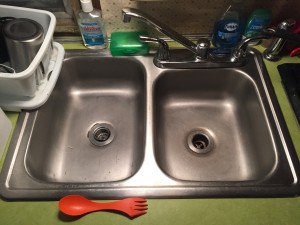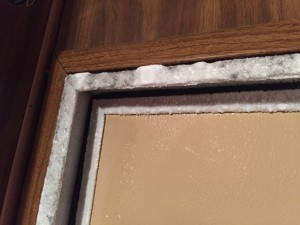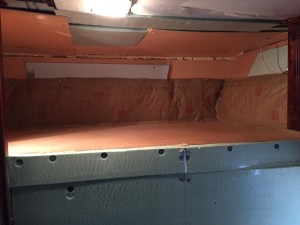From a small space colony on Mars, the 10th incarnation or Dr. Who once proclaimed that “Water always wins”. Similar words have been spoken by many, and how true they are. Usually this phrase is in reference to the forceful nature of water. Be it the quick and powerful decimation of a tsunami, or the slow and persistent relentlessness of a river carving a canyon. For the homeowner, it refers to the nagging inevitability that ALL roofs eventually need repair. Water will always find the tiniest of flaws and proceed to reek havoc. I’ve certainly had to repair a significant amount of water damage from the moment I purchased my camper, and I continue to find small leaks as time goes on (In fact, I woke up to a water leak on my head during a recent warm spell). But the phrase has taken on a new and more subtle meaning for me, in regards to two factors; moisture and temperature.

The first ‘tragedy’ involved my water system. Being that the whole system is contained under the kitchen counter, the temperatures get a little colder down there. I knew this would be the case, and I left a couple of air gaps to allow some warmer air in, but it was apparently not enough. The bottom of the cabinet is essentially the top of the wheel well. I did not realize how poorly insulated this wheel well was. As it turns out, it’s not really insulated at all. A couple of days after Christmas, I arrived home to find the water was not flowing. I used a heat gun to thaw the pipes, but it was too late. The expanding water must have caused a small leak. This caused the pump to turn on and pump out all the water remaining in the tank. Once the water was gone, the pump just ran and ran until it burned itself out. The good news is that the tank was all but empty, meaning there wasn’t really any spill to deal with. But my pump was dead, and so was my wallet, so I’m back to living out of a water bucket.
This is just one example that proves the complexities of the simple life (a whole post is coming soon on that). In reality, there is no simpler water system than a “good ol’ bucket o’ water”, but it makes using the water more complex. Doing dishes becomes a clunky and messy chore sans faucet – and a tiny sink does little to alleviate the matter.

My other surprising issue was moisture related. I went into this endeavor with an awareness for the potential of moisture issues. I’ve spent enough nights in campers and tents to know just how much moisture results from human breath alone, even from one person. I hadn’t really noticed any moisture issue in this camper. The thermostat I built includes a humidity sensor, and it reports quite low levels of moisture. The only time I see moisture on the walls is if I cook with lots of water, which is rare. The one issue that is consistent is frost around my door. The frame is metal, and acts as a thermal bridge to the outside. When moisture condenses on it, it freezes, but this is not really a problem. It merely shows that there is, in fact, moisture in the air.

One day, I had to shift my bedding around. My bed is made up in layers with a Reflectix insulation layer, a camping pad, a foam pad, and a ‘tempurpedic’ pad. While rearranging the layers, I noticed that it was wet underneath. It turns out that the moisture from my overnight breathing was collecting up there (the bed area is elevated over the cab of the vehicle) and it would condense in the corners where it was colder. This would collect as frost when it was cold, and eventually melt, creating small puddles of collected water. A few spots had even begun to develop black mold, which can be a huge health risk. I pulled it all apart to dry up, and slept on the “couch” for a while. I bleached away the black mold, added a layer of fiberglass insulation, and sealed everything with weather tape. I’m back sleeping up there. It is much improved, but cold nights can still result in mild frost, so I have to monitor it often. Luckily, it’s been a mild winter here in northern Maine. My coldest measurement so far has been 16 degrees below 0 (about -30 with wind chill) and that was brief. Usually, we see spells of 20 below for a week or more at at time.
I’ve learned that this vehicle seems to do quite well down to around 20 degrees. Beyond that, things become more of a struggle. I have to say that of all the challenges I expected, frost wasn’t really on my radar. All in all, the cold is manageable, but this structure is far from practical or efficient to be feasible in this extreme of an environment. Next winter will have to involve a new plan, because Jack Frost is an asshole.
